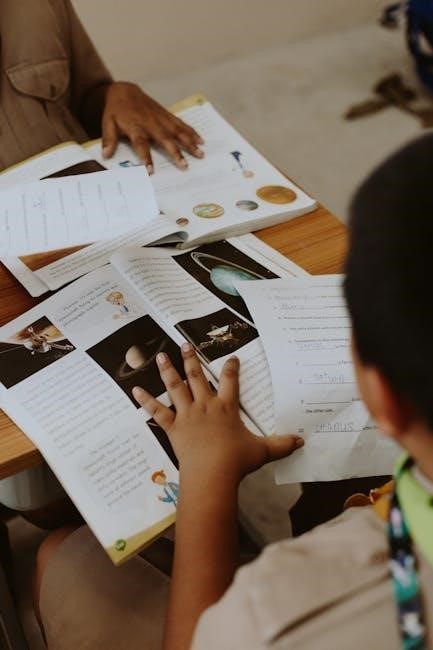Atomic Habits PDF: A Comprehensive Guide (Free Download)
Discover a pathway to profound change with the “Atomic Habits” PDF, offering a complete guide to building good habits and breaking bad ones.
Explore strategies for incremental improvements, leveraging the power of small changes to achieve remarkable results, mirroring the insights found within the complete, free PDF version.
Understanding the Core Concepts
The foundational principles of “Atomic Habits” revolve around the idea that significant life changes aren’t born from massive, sweeping actions, but rather from the accumulation of tiny, incremental improvements – the “atomic habits” themselves. This approach dismantles the overwhelming pressure often associated with traditional goal-setting, replacing it with a system focused on consistent, manageable steps.
The book emphasizes that habits are not about having the will to change, but designing a system that makes good habits inevitable and bad habits impossible. Understanding this core concept is crucial; it’s about focusing on the process rather than the outcome. The free PDF version comprehensively details these concepts, offering practical strategies for habit formation and sustained behavioral change, allowing readers to unlock their potential through small, consistent actions.
What are Atomic Habits?
Atomic Habits are small, incremental changes—1% improvements—that accumulate over time, leading to remarkable results, as detailed in the complete PDF guide.
The Power of Small Changes
The core philosophy of “Atomic Habits” revolves around the profound impact of seemingly insignificant adjustments. James Clear argues that improvements of just 1% each day compound exponentially over time, leading to dramatic transformations. This contrasts sharply with the often-disheartening pursuit of ambitious goals that yield little immediate progress.
The complete PDF version emphasizes that focusing on systems, rather than goals, is crucial. Systems are the processes that lead to results, and small, consistent improvements to these systems are far more sustainable than relying on motivation or willpower alone. These tiny changes, when consistently applied, build momentum and create lasting habits. The book provides practical strategies, detailed within the free PDF, to implement this philosophy in various aspects of life, from health and fitness to productivity and relationships.
Why Traditional Goal Setting Often Fails
Traditional goal setting frequently falters because it prioritizes what you want to achieve, neglecting how you will achieve it. The “Atomic Habits” PDF highlights that goals are merely aspirations, lacking the structured processes needed for consistent progress. Many individuals set lofty ambitions, but without a clear system, motivation wanes, and setbacks become demotivating.
The complete, free PDF version details how focusing solely on outcomes can lead to disappointment and abandonment. It’s easy to become discouraged when immediate results aren’t visible. Clear advocates for shifting focus to the daily systems that support goal attainment. These systems, built on small habits, provide a more reliable path to success, as outlined extensively within the downloadable PDF resource. This approach fosters continuous improvement, regardless of initial setbacks.
The Four Laws of Behavior Change
Unlock lasting habit transformation through the four core laws detailed in the “Atomic Habits” PDF: cue, craving, response, and reward—a complete, free guide.
First Law: Make It Obvious
The initial law centers on increasing awareness of your habits. Often, we operate on autopilot, unaware of the behaviors driving our days. The “Atomic Habits” PDF emphasizes bringing these unconscious routines into conscious view.
Habit Stacking involves linking a new habit to an existing one. For example, “After I brush my teeth, I will read one page of a book.” This leverages established routines as triggers for new behaviors, detailed within the free PDF.
Implementation Intentions focus on pre-planning when and where you’ll perform a habit. The formula is: “I will [behavior] at [time] in [location].” This specificity reduces ambiguity and increases the likelihood of following through, as explained in the complete guide. Making cues visible is paramount for initiating positive change.
Habit Stacking
Habit stacking, a core technique detailed in the “Atomic Habits” PDF, revolves around leveraging existing routines to introduce new ones seamlessly. It’s about identifying current habits – things you already do without thinking – and attaching the desired new behavior directly afterward.
The formula is simple: “After [current habit], I will [new habit].” For instance, “After I pour my morning coffee, I will meditate for five minutes.” This minimizes the mental effort required to start, as the existing habit acts as a natural trigger.
The free PDF emphasizes choosing a current habit that is reliably performed. The more consistent the trigger, the more likely the new habit will stick. This strategy builds momentum and makes habit formation feel less daunting, fostering long-term adherence.
Implementation Intentions
Implementation intentions, a powerful strategy highlighted within the “Atomic Habits” PDF, involve pre-planning when and where you will perform a new habit. It’s more specific than simply intending to do something; it’s a concrete commitment to a specific situation.
The formula is: “I will [behavior] at [time] in [location].” For example, “I will do ten push-ups at 7:00 AM in my living room.” This clarifies ambiguity and reduces the chance of procrastination. The free PDF stresses that this technique increases the likelihood of following through because your brain has already mapped out the response.
By linking a cue (time and location) to a behavior, you create a mental shortcut, making the habit more automatic. This proactive approach, detailed in the complete guide, transforms good intentions into consistent action.
Second Law: Make It Attractive
The Second Law of Behavior Change, as detailed in the “Atomic Habits” PDF, centers on making habits appealing. We’re more likely to repeat behaviors we enjoy or associate with positive experiences. The complete, free PDF emphasizes that craving drives habit formation, not just discipline.
To increase attractiveness, the guide suggests pairing an action you want to do with an action you need to do – a technique called temptation bundling. For instance, listening to an audiobook (want) while exercising (need).
Furthermore, surrounding yourself with a culture where your desired behavior is the norm significantly boosts motivation. The PDF highlights that we are heavily influenced by our social circles; joining a group with similar goals makes the habit more attractive and provides support.
Temptation Bundling
As explored within the comprehensive “Atomic Habits” PDF, temptation bundling is a powerful strategy to make desired habits more attractive. This technique involves pairing an action you want to do with an action you need to do. The free PDF version details how this leverages the dopamine rush associated with pleasurable activities to reinforce positive behaviors.
Essentially, you link something you enjoy – like watching your favorite show or listening to music – with a habit you’re trying to build, such as exercising or reading.
The “Atomic Habits” PDF emphasizes that by bundling, you create a situation where you look forward to the necessary habit, increasing the likelihood of consistent practice and long-term adherence. It’s about making what’s good for you, enjoyable.
Joining a Culture Where Your Desired Behavior is Normal
The “Atomic Habits” PDF highlights the significant impact of our surrounding environment on habit formation. A key strategy, detailed in the complete, free PDF, is to join a culture where your desired behavior is already the norm. We are profoundly influenced by the habits of those around us, making it easier to adopt behaviors when they are socially accepted and encouraged.
This isn’t simply about finding like-minded individuals; it’s about immersing yourself in a community that actively embodies the habits you wish to cultivate. The PDF explains how this reduces friction and provides social support, making the journey towards change less daunting.
Finding or creating such a culture dramatically increases your chances of success.
Third Law: Make It Easy
The “Atomic Habits” PDF emphasizes that reducing friction is paramount to building lasting habits. This third law, thoroughly explored in the complete, free PDF version, focuses on minimizing the effort required to perform a desired behavior. The goal isn’t necessarily to increase motivation, but to decrease the steps between you and your good habits.
This principle suggests designing your environment to support your desired actions. The PDF details practical strategies like the “Two-Minute Rule,” breaking down large habits into incredibly small, manageable steps that require minimal effort to initiate.
By making habits easy, you increase the likelihood of consistently performing them.
The Two-Minute Rule
As detailed within the comprehensive “Atomic Habits” PDF, the Two-Minute Rule is a powerful strategy for overcoming procrastination and initiating new habits. The core idea, thoroughly explained in the free PDF version, is to scale down your desired habit into an action that takes two minutes or less to complete. This drastically lowers the barrier to entry and makes starting incredibly easy.
For example, instead of “read before bed,” aim for “read one page.” Instead of “do yoga,” aim for “take out your yoga mat.” The PDF emphasizes that mastering a new habit isn’t about achieving the end result immediately, but about establishing the initial momentum.
Once you’ve started, it’s much easier to continue.
Reducing Friction
The “Atomic Habits” PDF extensively covers the concept of reducing friction as a key component of habit formation. This principle, detailed within the free PDF guide, focuses on minimizing the effort required to perform a desired behavior. By decreasing the number of steps between you and your good habits, you increase the likelihood of actually doing them.
The PDF illustrates this with practical examples: laying out your workout clothes the night before, prepping healthy meals in advance, or keeping a book readily accessible. Conversely, increasing friction for bad habits – like hiding the TV remote or deleting distracting apps – makes them less appealing.
Essentially, design your environment to make good habits convenient and bad habits difficult.
Fourth Law: Make It Satisfying
The “Atomic Habits” PDF emphasizes that what is immediately rewarded is what we repeat. This Fourth Law, thoroughly explored in the free PDF version, centers on making the experience of completing a habit enjoyable and satisfying. It’s not enough to simply do the habit; you need to feel good about doing it.
The PDF suggests using reinforcement techniques like a habit tracker to visually monitor progress, creating a sense of accomplishment. Never missing twice is another key strategy – allowing occasional slip-ups without derailing the entire system.
Ultimately, the goal is to associate positive emotions with your habits, making them intrinsically rewarding and increasing the likelihood of long-term adherence.
Using a Habit Tracker
As detailed within the “Atomic Habits” PDF, a habit tracker is a simple yet powerful tool for making habits satisfying. The free PDF version highlights how visually monitoring your progress provides immediate reinforcement, fueling motivation. Each checkmark in the tracker acts as a small win, creating a sense of accomplishment and encouraging continued effort;
This isn’t about perfection; it’s about visibility. The tracker makes your habits concrete and observable, transforming abstract goals into tangible results. The PDF emphasizes that the act of tracking itself increases awareness and accountability.
Experiment with different tracking methods – digital apps, spreadsheets, or a simple paper calendar – to find what best suits your preferences and keeps you engaged.
Never Miss Twice
The “Atomic Habits” PDF stresses a crucial principle: never miss a habit twice in a row. As outlined in the free PDF version, life inevitably throws curveballs, and occasional slip-ups are unavoidable. However, allowing a single missed instance to snowball into a pattern of inconsistency can derail your progress.
The key isn’t to avoid mistakes entirely, but to get back on track immediately. Missing once is an error; missing twice is the start of a new habit – the habit of failing. This concept, thoroughly explained in the PDF, emphasizes the importance of resilience and rapid course correction.
View setbacks as temporary deviations, not complete failures, and recommit to your habits without delay.
Finding and Utilizing Free PDF Resources
Accessing the “Atomic Habits” PDF requires caution; prioritize legitimate sources to ensure you receive a complete, safe, and authentic version of the guide.
Legitimate Sources for “Atomic Habits” PDF
Finding a free, complete, and legal PDF of “Atomic Habits” can be challenging, but several avenues offer reliable access. Often, authors and publishers provide sample chapters or excerpts as promotional material on their official websites – James Clear’s website (jamesclear.com) is the primary place to start.
Legitimate online libraries, such as those affiliated with educational institutions or public library systems, may offer digital copies for borrowing. Platforms like Scribd or Kindle Unlimited sometimes include “Atomic Habits” in their subscription services, providing access for a monthly fee.
Be wary of websites promising a “free full PDF download” without clear attribution or appearing unprofessional. These sites frequently host malware or incomplete, pirated versions. Always verify the source’s credibility before downloading any files to protect your device and ensure you’re accessing authentic content. Prioritize official channels and reputable platforms for a safe and complete reading experience.
Risks of Downloading from Unofficial Websites
Downloading the “Atomic Habits” PDF from unofficial websites carries significant risks. These sites often distribute malware, viruses, and other malicious software disguised as legitimate files, potentially compromising your device and personal data. Pirated PDFs may also be incomplete, poorly formatted, or contain errors, diminishing the reading experience and hindering comprehension.
Furthermore, accessing copyrighted material through unauthorized channels is illegal and unethical, undermining the author’s work and the publishing industry. Unofficial sources frequently lack proper security measures, increasing the likelihood of encountering phishing scams or identity theft attempts.
Protect yourself by prioritizing legitimate sources, such as the author’s official website or reputable online bookstores. Avoid websites promising “free full PDF downloads” that seem too good to be true, as they often conceal hidden dangers. Safeguard your digital wellbeing and respect intellectual property rights by choosing safe and legal access methods.
Applying Atomic Habits to Daily Life
Implement the principles from the “Atomic Habits” PDF to transform routines, fostering positive change through consistent, small actions for lasting improvements.
Habits for Health and Fitness
Leveraging the “Atomic Habits” framework, cultivate a healthier lifestyle through incremental adjustments. Begin with the two-minute rule: commit to just two minutes of exercise daily, gradually increasing duration. Make healthy choices obvious by prepping nutritious meals in advance and placing workout clothes where you’ll see them.
Reduce friction by choosing a gym close to home or work, or investing in home fitness equipment. Temptation bundle by pairing a desired activity (like watching your favorite show) with exercise. Track your progress using a habit tracker to reinforce positive behaviors and maintain motivation. Never miss a workout twice in a row; a single slip-up is acceptable, but consistency is key. Focus on systems, not goals, and celebrate small wins to build momentum.
Habits for Productivity and Work
Apply “Atomic Habits” principles to boost workplace efficiency. Implement “implementation intentions” – specifically plan when and where you’ll work on a task. Stack habits by linking a new work habit to an existing routine, like checking emails after your morning coffee. Make your workspace conducive to focus by minimizing distractions and organizing your tools.
Reduce friction by automating repetitive tasks or breaking down large projects into smaller, manageable steps. Use a habit tracker to monitor your progress on key work habits, like dedicated focus blocks or daily task completion. Temptation bundling can pair a less desirable task with a reward. Remember, consistency trumps intensity; small, daily improvements compound over time, leading to significant gains in productivity.

























































































